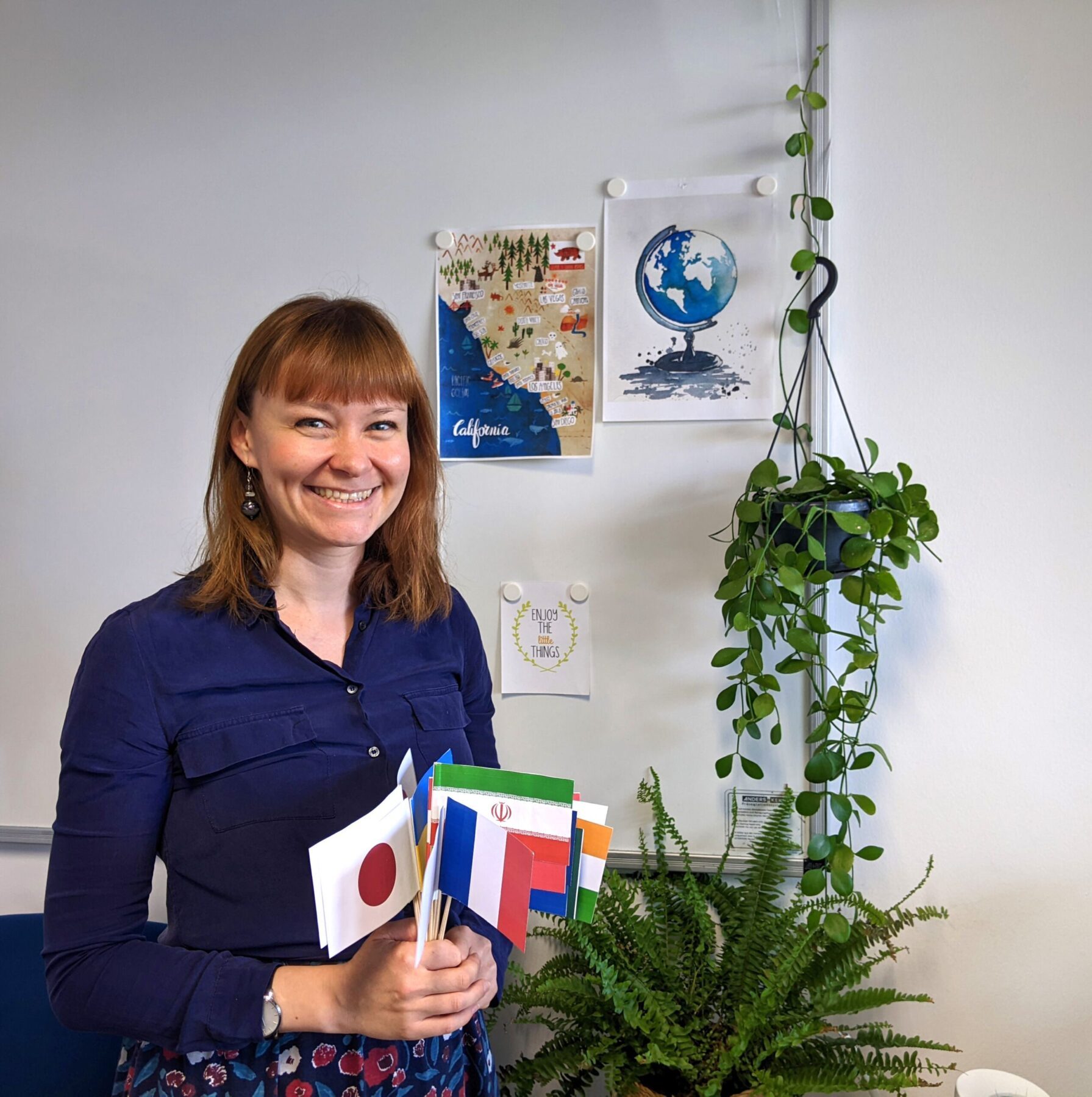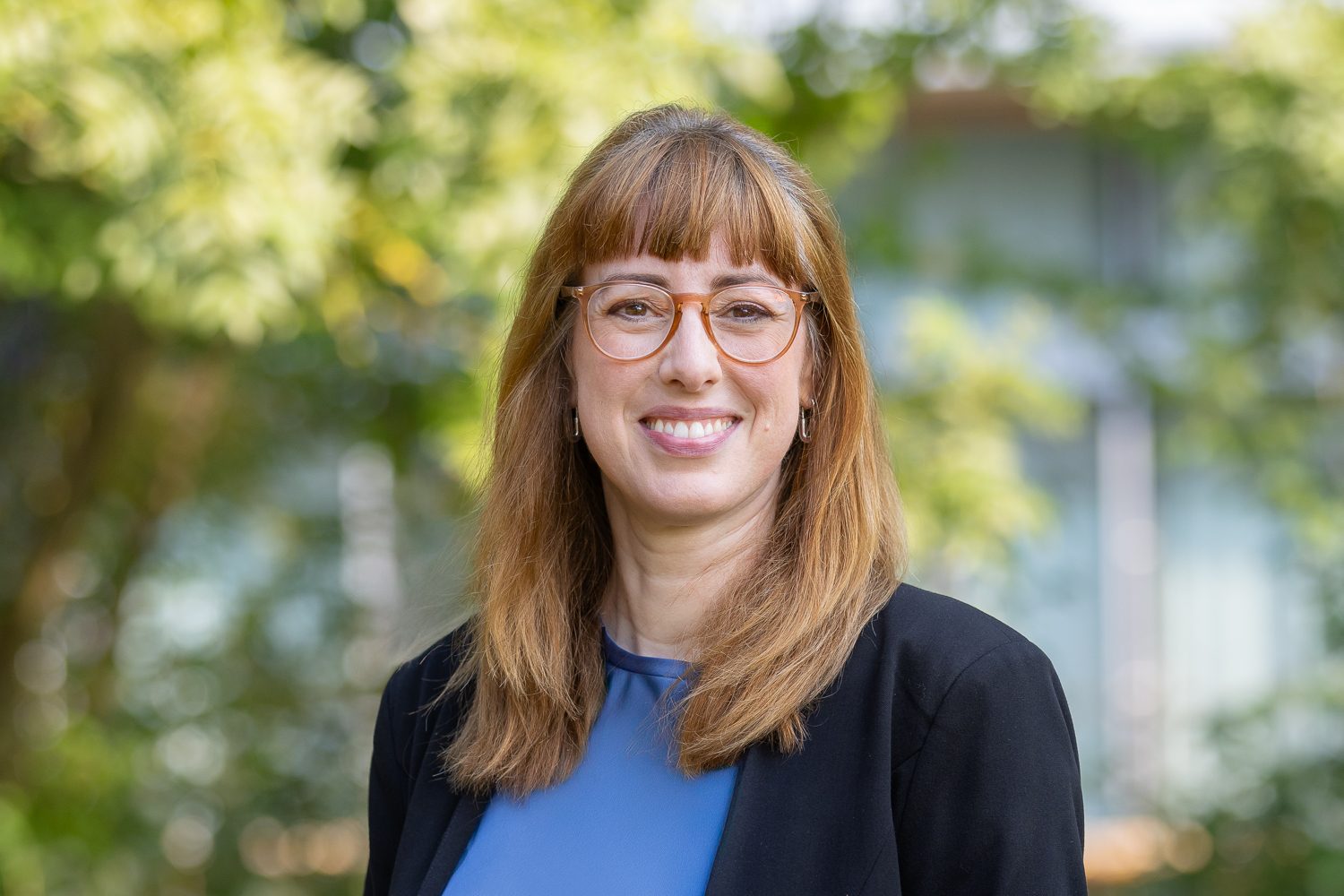
»Moving to Another Country Is Never a Trivial Thing to Do.« – How Darya Niakhaichyk Helps International Researchers Ease in Germany
From getting a visa to finding an English-speaking doctor, Darya Niakhaichyk helps international researchers at the Max Planck Institute for Gravitational Physics with navigating their stay in Potsdam, Germany – and knows many of their challenges from experience.
When talking about the special atmosphere at the Potsdam Science Park and her own work there, Darya Niakhaichyk comes up with an intriguing formulation: “It feels like traveling – without the traveling.”, she says. In that sense, she is somewhat of a globetrotter, so to speak. Darya works as an International Officer for the Max Planck Institute for Gravitational Physics (Albert Einstein Institute, AEI). While the well known research institute is rather small compared to the other two Max Planck Institutes at the site, as she explains, it perfectly showcases today’s cosmopolitian science community. “Currently, researchers at the institute hail from around thirty different nations from all over the world, mainly from Europe, Asia as well as North and South America.”
Smoothing out the arrivals and daily lives of AEI’s international researchers in Germany
Darya makes sure their relocation to (and sometimes from) the city of Potsdam, and their time in Germany, feel as smooth as possible. “Taking up a job at the AEI means shifting their center of life, sometimes temporally, for a couple of months or years, sometimes permanently. Of course, most of them are experienced PhD or postdocs, and have often lived and worked abroad before. Yet, packing up and moving to another country is never a trivial thing to do.” Darya’s task typically begins long before a scientist first sets foot in Germany: “I help them sort out some of the most pressing questions about their move: What needs to be organized before they leave their current home? What has to be done before coming to the Potsdam Science Park?” This results in a lot of time Niakhaichyk spends liaising between researchers and their various interlocutors: embassies and immigration offices, for visa and other documentation, but also, say, potential landlords so the scientists have a new place to call home. Once the new staff member arrives, she also helps them navigate their new environment, for example with finding a doctor who offers consultations in English. “Here in the metropolitan region of Berlin and Potsdam, these things are challenging enough already, but the difficulty is just on another level for someone coming from abroad, with different language or cultural background.” Sometimes, she jokes, German bureaucracy and the formal way of doing things could feel a bit Kafkaesque for uninitiated. But so far, she has managed to help every newcomer find their respective way.
Giving a space to the international science community
Despite the variety of nationalities and backgrounds at the Potsdam Science Park, getting to grips with this multicultural environment can sometimes be difficult for outsiders, especially at institutions that are grounded in the natural sciences – like the AEI, where cultural backgrounds often necessarily take a back seat and everyone speaks the “universal” languages of mathematics and physics. But spending time with Darya and listening to her stories, you get an almost instant feel for what it’s like working here and “traveling without the traveling”. Her office walls are covered with photographs of events organized by her or the Institute’s international staff, such as a small Hanami (“flower viewing”) party laid on by AEI’s Japanese community, and her passion for her work is infectious: she finds inspiration through working with people from all corners of the world, from multiple walks of life and with sometimes vastly different perspectives.
Maybe Darya is so good at making the international environment of the Max Planck Institute work because, in her own way, she’s a prime example of it. Prior to joining AEI at the Potsdam Science Park as an International Officer, she grew up in Minsk, Belarus, where she studied English, Italian and Intercultural Communication. After graduating, she moved to Fulda, Germany in 2012 for a Master’s degree in Intercultural Communication and European Studies, also fitting in internships at the Istituto Venezia in Venice and the Goethe-Institut in Dresden. For the last decade, in other words, Darya has experienced first-hand what it feels like to live and work abroad, how challenging it can sometimes be, but also how rewarding it can feel. When she first moved to Germany, she recalls, a personal friend helped her out with a lot of the things she was still new to and made it easier to settle in – something she feels incredibly grateful for. “I was lucky,” she says. That’s why she also considers her work at AEI as a way of ‘paying back’ some of her good fortune. “In a way, when I support new researchers coming to AEI, it feels a bit like I’m helping my own self from back then.”
Fusing rural calm and metropolitan buzz
As a location, the Potsdam Science Park does a lot to help international researchers feel at home in the country, Darya points out: “It is a very unique advantage that we have so many high-quality research institutions clustered in one place – all of which have an international mindset.” The Science Park Location Management also offers many helpful newcomer services, ranging from the welcome week to presentations on the German tax system at the Startup Academy or networking events like the »Business and Beer« after-work community gathering where everyone working in the Park can meet in a relaxed atmosphere (and also drink soda, of course). Asked if there was anything she would like to improve at the Potsdam Science Park, Darya quips, “more ATMs!” – but is quick to praise its advantageous location in the green district of Potsdam-Golm, close to and the German capital Berlin: “Working in the Potsdam Science Park allows you to have the best of both worlds, basically. Some people are natural city slickers, and with the two main cities just a short trip away, what more can they ask for?” Others may set much greater store on the natural surroundings of Potsdam-Golm, an environment that helps calm their minds and lets them concentrate on their work undisturbed. Darya puts herself somewhere in between these two extremes. While she enjoys the bustle of Berlin’s Charlottenburg district where she lives, she also savors the tranquility of her daily walk to her office, “the scenic route”, as she calls it affectionately, one that leads past a little pond. What does she feel when she walks by it? Maybe it’s something like: ‘Coming home’.
This blog and the projects of Standortmanagement Golm GmbH in Potsdam Science Park are funded by the European Regional Development Fund (ERDF) and the State of Brandenburg. Bildnachweis: Darya Niakhaichyk, International Officer at the MPI AEI © Max Planck Institute for Gravitational Physics/Matteo Broccoli
Contact

Karen Esser
PR & Communications
karen.esser@potsdam-sciencepark.de + 49 331 237 351 103